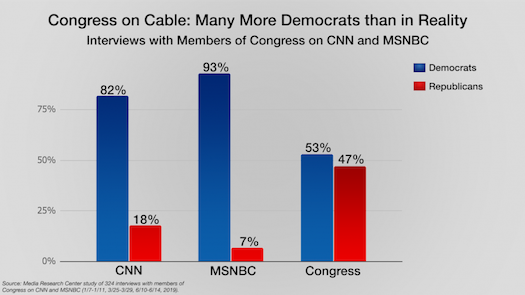In an Aug. 16 post, the Media Research Center’s Tim Graham was cheering Republican members of Congress and other Republican politicians for refusing to go on CNN:
CNN host Jake Tapper appeared for another jovial liberal go-around on NBC’s Late Night with Seth Meyers last night. Meyers and Tapper discussed how President Trump was “crazy,” Rep. Steve King was “crazy,” and Republicans were somehow crazy to avoid a hostile CNN interview a few hours after two mass shootings.
Republicans at home surely shot back at the TV: “Maybe the Republicans watched Tapper’s emotionally manipulative CNN town hall after the Parkland shooting! You know, the one where Senator Marco Rubio was abused as being like the Parkland killer? And Dana Loesch was called a bad mother? And Tapper stood by, saying nothing?”
The MRC promoted Graham’s post on its NewsBusters Twitter account by sneering, “Is it REALLY hard to believe GOPers would avoid hostile @CNN interrogations after mass shootings?”
Three days later, the MRC attacked CNN and “liberal cable news networks” for not having enough Republicans on.
Rich Noyes and Bill D’Agostino wrote:
Congress may be almost evenly divided these days, but not on the liberal cable news networks. A new study by the Media Research Center finds that CNN and MSNBC host Democratic Representatives and Senators seven times more frequently than their Republican counterparts, and most often use Democratic talking points to question members of both parties.
[…]Our analysts found an overwhelming partisan bias on MSNBC, where congressional Democrats were interviewed 13 times more often than their GOP counterparts during these sample weeks (148 Democrats vs. just 11 Republicans). On CNN, the ratio was a still wildly-imbalanced four to one (136 vs. 29).
Noyes and D’Agostino failed to mention that their employer actively discourage Republicans from appearing on CNN and MSNBC — which means the numbers are skewed and manipulated.
Also missing is any judgment for comparison purposes of the number of congressional guests on Fox News.
Noyes and D’Agostino also threw in the MRC’s usual murky, subjective judging of questions asked of guests:
When Republicans were interviewed, they routinely faced adversarial questions that reflected a Democratic agenda, yet Democratic guests were rarely confronted with Republican talking points.
For this study, an agenda question was defined one which challenged the interviewee with a recognizable talking point from the opposing party. These could involve arguments on various policy issues, political confrontations such as the partial government shutdown, or the various investigations of the President. (See examples below.)
Republican guests faced a total of 310 questions, just over half of which (156, or 50%) could be classified as reflecting the agenda of one party or the other. Of those, 152 (97%) reflected an adversarial/Democratic agenda, compared to a mere four (2.5%) based on a friendlier, Republican agenda.
For Democrats, the terrain was far more hospitable. Of 660 questions identified as having a partisan tilt (out of 1,653 total questions), 535 (81%) were based on a friendly Democratic agenda, while the remaining 125 (19%) asked the Democrats to respond to an adversarial/Republican agenda.
As usual, they fail to provide the complete data that would show how each question was judged — perhaps because they know the judging isn’t subjective, as it’s highly likely that the ideological conservatives employed by the MRC are more likely to declare a question they judge to be insufficiently “Republican” to be “Democrat.” And. again, a Fox News comparison is missing — it surely hurls many more softballs to Republican representatives than the (presumably few) Democratic representatives that appear.
We always knew that MRC studies were dishonest and too ideological to be taken seriously. This time, its shady methods have been exposed — it can’t praise GOP representatives for refusing to go on CNN and MSNBC, then attack those channels for not having more GOP reps on, and expect anyone to consider such “media research” to be credible.
